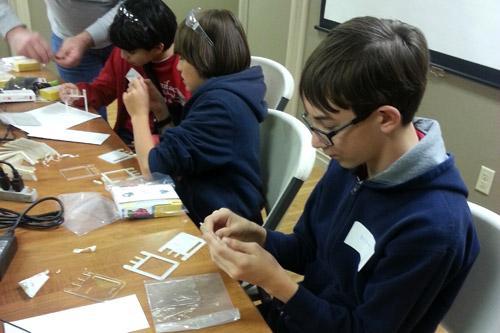
FORT SMITH — Like children all over the world, St. Boniface School sixth-graders recently received their Raspberry Pi.
“They’re an early graduation gift — and much more,” principal Dr. Karen Hollenbeck said.
The inexpensive, credit card-sized computers can be used for electronics projects, spreadsheets, word processing and games. They are also being used to teach programming to children around the world.
The gifts were received last week from the school’s educational partner, KMF Metal Fabrication, during an on-site visit to the plant.
Christy and David Koprovic, co-owners of KMF and parents of nine children who have attended or will attend St. Boniface School, became interested in Raspberry Pi after attending the Arkansas Jobs Summit Conference and learning that by 2022, only 23 percent of jobs will require a bachelor’s degree or advanced degree. Technology is moving into an “anticipatory” stage in which many jobs — secretarial, accounting, technical writing, economics and others —will be replaced by algorithms written by computers. Jobs in 2022 will be focused on manufacturing, agriculture, construction and trucking, they said.
“We wanted to launch a year-long project with sixth graders that would allow them to see how computers are used in our shop and how things are made, to help them understand how important computers are to any future career they will have,” Christy Koprovic said. “Running Windows, playing games and writing reports are not the applications that will help them in the future.”
When the sixth graders arrived at KMF with Hollenbeck and teacher Rebecca Kaelin, Christy Koprovic greeted them at the door and gave each student a Raspberry Pi in a little bag. The Pi looks like a tiny motherboard with all the circuitry exposed, and KMF had designed transparent, personalized cases that the students could assemble at the factory. Koprovic showed them how the case design was programmed into a laser cutter which cut enough case parts for all the Pis from one large plastic sheet. After giving the class a factory tour highlighting how computers are used in the manufacturing process, she brought them upstairs to assemble their Pi cases.
“We want the students to realize that the skills they are learning now are crucial for the things they will be doing in the future,” Koprovic said. “Knowing how to code a computer and telling it what you need it to do will be a valuable skill as we look at future jobs and education.”
Although a Raspberry Pi can be hooked up to a keyboard, mouse and monitor and used for traditional desktop applications, it is designed to be programmed by its users. The non-profit Raspberry Pi Foundation, headquartered in the United Kingdom, was formed when its founders saw that while students in the 1990s came to university as experienced hobbyist programmers, a 21st century student might have only done a little web design. The way kids interacted with computers had changed, and the Raspberry Pi designers wanted to design a small, affordable computer so that every child could practice and develop coding skills.
The Koprovics will be team-teaching programming skills to the sixth graders once a week, bringing mentors from the plant to assist at each session. Christy Koprovic is a former St. Boniface teacher, but husband David is the real techie of the pair.
“I like the idea that the Raspberry Pi uses open source software,” David Koprovic said. “Computers are great tools, but only if the people using them know what to do.”
Hollenbeck said she is excited about the Raspberry Pi’s potential in every area of the curriculum.
“The Raspberry Pis meet many of the sixth-grade standards in lots of different subject areas, including math (problem solving and critical thinking), science (information gathering skills, using the scientific method, predicting outcomes, recognizing cause and effect, and many others), language (listening skills, sharing information, developing new vocabulary).”
Please read our Comments Policy before posting.
Article comments powered by Disqus 2023 Year in Review: Community, teamwork prove pivotal
2023 Year in Review: Community, teamwork prove pivotal
 Catholic school careers lead teachers, staff into faith
Catholic school careers lead teachers, staff into faith
 Off-duty officers patrol Christ the King in Fort Smith
Off-duty officers patrol Christ the King in Fort Smith
 Four schools welcome new leadership this school year
Four schools welcome new leadership this school year
 Ark. Catholic schools grapple with teacher shortage
Ark. Catholic schools grapple with teacher shortage
 Winning directory photo honors Our Lady of Guadalupe
Winning directory photo honors Our Lady of Guadalupe
 St. Paul says: How does the Bible define love?
St. Paul says: How does the Bible define love?
 6 steps to getting married in Diocese of Little Rock
6 steps to getting married in Diocese of Little Rock
 Most frequently asked questions on Catholic marriage
Most frequently asked questions on Catholic marriage
 St. Joseph a model of solidarity with immigrants
St. Joseph a model of solidarity with immigrants
 Two gifts after Jesus’ death: Virgin Mary and Eucharist
Two gifts after Jesus’ death: Virgin Mary and Eucharist
 Why we have an altar, and not just a communion table
Why we have an altar, and not just a communion table
 Pope: Wars should be resolved through nonviolence
Pope: Wars should be resolved through nonviolence
 Living relationship with Jesus Christ in the Eucharist
Living relationship with Jesus Christ in the Eucharist